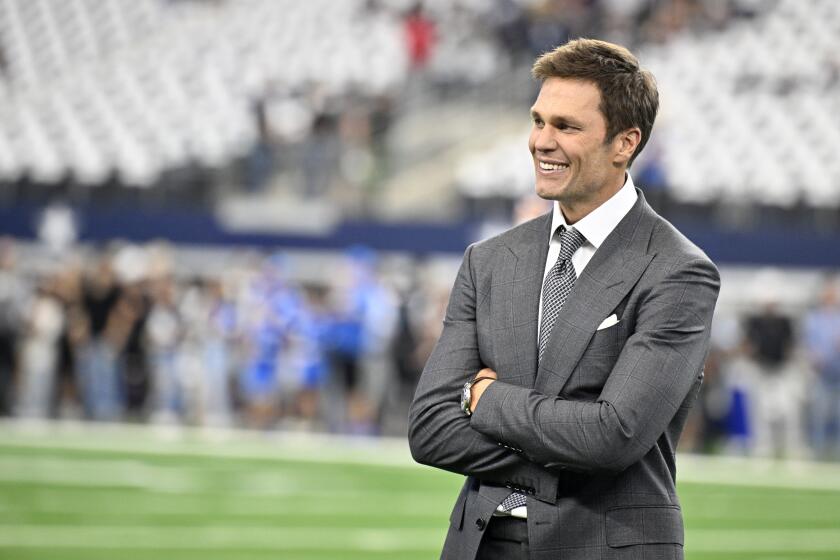COMMENTARY : With Mickey Mantle, There’s a Message in the Bottle
He wasted much of his talent. He let down the father who loved him and sacrificed for him. He insulted many who admired him and wronged most who loved him. He ignored his sons until they were old enough to drink with him; then, as a middle-aged self-pitying melancholic, he enlisted them as late-night buddies. Once he finally sobered up (after a 42-year bender), he wrote about his alcoholism, thus bringing himself money, sympathy, notoriety and reawakened popularity. At least that’s what Mickey Mantle has said about himself for the past year.
Yet this week much of America is praying for The Mick. Baseball’s favorite tragic wastrel needs a liver donor -- fast -- in hopes a transplant may save his life. To millions who remember Mantle as the most glamorous, gifted and star-crossed athlete of the ‘50’s and early ‘60’s, news of his life-and-death fight at age 63 almost calls for a national moment of silence.
His tape-measure home runs and world-class speed, plus his injuries and escapades, made him a walking symbol -- of anything you wanted to cook up. No. 7 was a gorgeous empty vessel that others filled with their own daydreams.
For a dozen years in his prime, Mantle was seen as an Oklahoma Adonis with a bat in one hand, a highball in the other and the enormous black cloud of an inherited family disease -- that had killed every Mantle male by 41 -- hanging over his head. His address: Yankee Stadium or the Copacabana.
Mantle swung with one desperate purpose. To be the first man to hit a ball out of Ruth’s House; or else break every vertebrae in his back while striking out. Mantle made no secret he expected to die young of Hodgkin’s Disease, like his grandfather, his father and his father’s two brothers. And he made it no secret that he intended to set the world record for excess before it got him.
That fatal flaw in America’s greatest athlete -- the Michael Jordan of his day, to help the young ones understand -- made him mythical even if he was also undeniably monosyllabic. You could imagine Mantle as many things. But not an old, despondent, self-lacerating alcoholic who thought he’d wasted his life.
For the last 25 years, Mantle has had the haunted look of a man who wondered why he was spared. And whether that constituted good luck or bad. No man ever prepared himself less for anything resembling normal life after pro sports. Mantle’s one good break, he assumed, was he’d never have to pay the piper.
How wrong can you be.
The Yankees’ Hall of Fame slugger is at Baylor University Medical Center with a not-so-great chance at survival. According to his doctor, Mantle has inoperable liver cancer, cirrhosis and hepatitis C. That’s three different liver diseases that each kill thousands every year.
Mantle also has a dangerous infection as well as every other symptom that goes along with decades of brandy-and-Kahlua for breakfast, three bottles of wine for lunch, five martinis at dinner, then vodka on the rocks until unconsciousness was achieved. That was Mantle’s diet in retirement. As a player, he said he drank slightly less.
“It’s day to day. . . . He will not get out of the hospital without getting a transplant,” was the bleak assessment of Dr. Kent Hamilton, Mantle’s attending physician. “The tumor cannot be removed safely. . . . his condition continues to worsen and. . . . the only way to save his life is a transplant.”
“There’s no indication the cancer has spread,” said Dr. Robert Goldstein, Mantle’s transplant surgeon. “He’s well enough (to have a transplant), but he is very sick. . . . He is very weak. He cannot get out of bed on his own. His jaundice is very far advanced.”
When you reread Mantle’s account of his mess of a life, you know why he’s in such grave peril. However, it’s tough to know whether to hug him and forgive him because, as our culture likes to say, he’s “so human.” Something in you wants to tell him that, while you wish him well, he got what he earned.
The sentence that always gets you, the one that perhaps paralyzes judgment, is Mantle’s claim that he didn’t start drinking until his father died -- when he was 20 -- after his rookie year with the Yanks. Barely a man, he crawled into the bottle to escape his grief. That sounds right, doesn’t it? Little did he know that the family disease that he needed to fear was on his mother’s side -- alcoholism. “If I’d known I’d live this long,” he often said, “I’d have taken better care of myself.”
Mantle’s story, and his rationalizations for self-destruction, are so sad that you don’t want to argue about blame. Is Mantle a self-indulgent jerk who took the easy way out -- a month in rehab and a confession in Sports Illustrated -- after a lifetime of kicking good people in the teeth? Or is he the victim of everything from a poor youth in a mining family to teenage celebrity in New York City to the horrid luck of having Billy Martin for a best friend?
There’ll be no Mantle verdict here. For decades, he was too big a skunk to exonerate. But he’s been too sad for too long to condemn. Like they say about ethical debates in foxholes, just keep shooting and let God sort ‘em out.
As Mantle has been the first to underline, he assassinated his own health. Still, it’s doubly cruel that his collapse came just one year after he made a national celebration of his sobriety and became a new kind of hero to many.
“You can’t believe the letters,” Mantle told the Pittsburgh Post-Gazette after “All My Octobers” was published. “I couldn’t start drinking again if I wanted to. It’s not just me now. I’ve never been this popular, I guess, in my life. . . . Before, it was, “Can you sign this ball?. . . . ‘ (Now) they just want to say, “Thanks a lot for what you did -- you got me back on track.’ Half the people that come through the book signings are guys with tears in their eyes.”
After a life of bottled-up emotions and frightened escape from seriousness, Mantle discovered in himself a disarming gift for raw honesty. He blamed himself -- and his drinking -- for contributing to the death of his 36-year-old son Bobby, who had many medical problems, exacerbated by drug and alcohol abuse.
Mantle also told about decades of memory loss that became so bad he couldn’t remember how he looked when he threw a ball (“Did I take a hop or a skip or something?”) or even recall “what my favorite pitch was or where I liked it.”
In one scalding insight, he said, “I’d never thought about anything serious in my life for a continuous period of days and weeks until I checked into the Betty Ford Center. . . . I’ve always tried to avoid anything emotional -- anything controversial, anything serious -- and I did it through alcohol. . . .
“All those years I lived the life of somebody else. A cartoon character. From now on, Mickey Mantle is going to be a real person.”
The reborn Mantle has had far too little time to become reacquainted with his family -- his incredibly tolerant wife, Merlyn, and his three remaining sons; a whole nation of fans wishes him a nearly miraculous recovery.
Still, if this is the end, it could have been much worse. It could have come two years ago. Let Mantle have a last word. A year ago, he wrote that “I’ve lived too much life already.” What he wanted, he said, was to regain the public’s respect -- and his self-respect. He said he didn’t want to be remembered as, “Well, there he is again, and he’s drunk.”
Now, our memories of Mantle are the right ones. Whatever happens, we’ll always think of him as a thrilling ballplayer who had the courage to take possession of himself at last and finish the game sober, sorry and honest.
More to Read
Go beyond the scoreboard
Get the latest on L.A.'s teams in the daily Sports Report newsletter.
You may occasionally receive promotional content from the Los Angeles Times.










